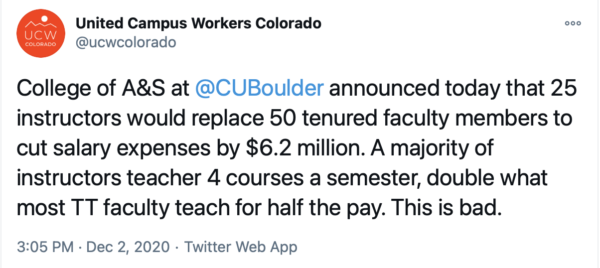In my Geek in Pictures post a couple days back I included this chart showing that the financial impact of COVID on colleges and universities has led to serious job cuts—back to the level last seen in 2008, right before the last major economic crisis. (Strangely, as you can see from the chart, the financial crisis in 2008-09 barely slowed the overall rise of university employment levels at all, unlike the current scene.)

Yesterday brought news of deepening cuts starting to take place among core faculty in the liberal arts. I was alerted to drastic cuts just announced in several liberal arts departments at the University of Colorado at Boulder by this tweet:

You can read the interim dean’s long explanation of the move here if you want.
At the University of Vermont, meanwhile, the cuts look to go well beyond mere faculty positions. Whole departments will be eliminated:
The University of Vermont announced proposed cuts Wednesday to 12 majors and 11 minors in the College of Arts and Sciences. University officials say the college has seen a 17% reduction in enrollment in liberal arts classes from 2010 to 2016. Low enrollment is defined as 25 or fewer students or fewer than 5 graduates per year.
The university plans to eliminate geology, religion and classics departments. Twelve out of 56 majors will go by the boards, including regional studies, romance languages and cultures, Latin, Greek, German, Russian and Italian.
You’ll notice that the cuts are all coming from the liberal arts. Gee, I wonder why liberal arts enrollment is declining? It’s a complete mystery. . .
To be fair, it’s not as though the sciences are exempt from the political madness afflicting our universities. Try out this article from the current issue of The Lancet, a formerly respected medical journal that has apparently been taken over by the Babylon Bee:
Neoliberal economics, planetary health, and the COVID-19 pandemic: a Marxist ecofeminist analysis
Simon Mair, PhD
Abstract
Planetary health sees neoliberal capitalism as a key mediator of socioecological crises, a position that is echoed in much COVID-19 commentary. In this Personal View, I set out an economic theory that emphasises some of the ways in which neoliberal capitalism’s conceptualisation of value has mediated responses to COVID-19. Using the intersection of ecological, feminist, and Marxist economics, I develop an analysis of neoliberal capitalism as a specific historical form of the economy. I identify the accumulation of exchange value as a central tendency of neoliberal capitalism and argue that this tendency creates barriers to the production of other forms of value. I then analyse the implications of this tendency in the context of responses to COVID-19. I argue that resources and labour flow to the production of exchange value, at the expense of production of other value forms. Consequently, the global capitalist economy has unprecedented productive capacity but uses little . . .
There’s more, but by now I expect most sensible people have stopped reading. I am glad, though, they they got intersectionality in the abstract, because I was concerned when it was not included in the article title.
Notice: All comments are subject to moderation. Our comments are intended to be a forum for civil discourse bearing on the subject under discussion. Commenters who stray beyond the bounds of civility or employ what we deem gratuitous vulgarity in a comment — including, but not limited to, “s***,” “f***,” “a*******,” or one of their many variants — will be banned without further notice in the sole discretion of the site moderator.